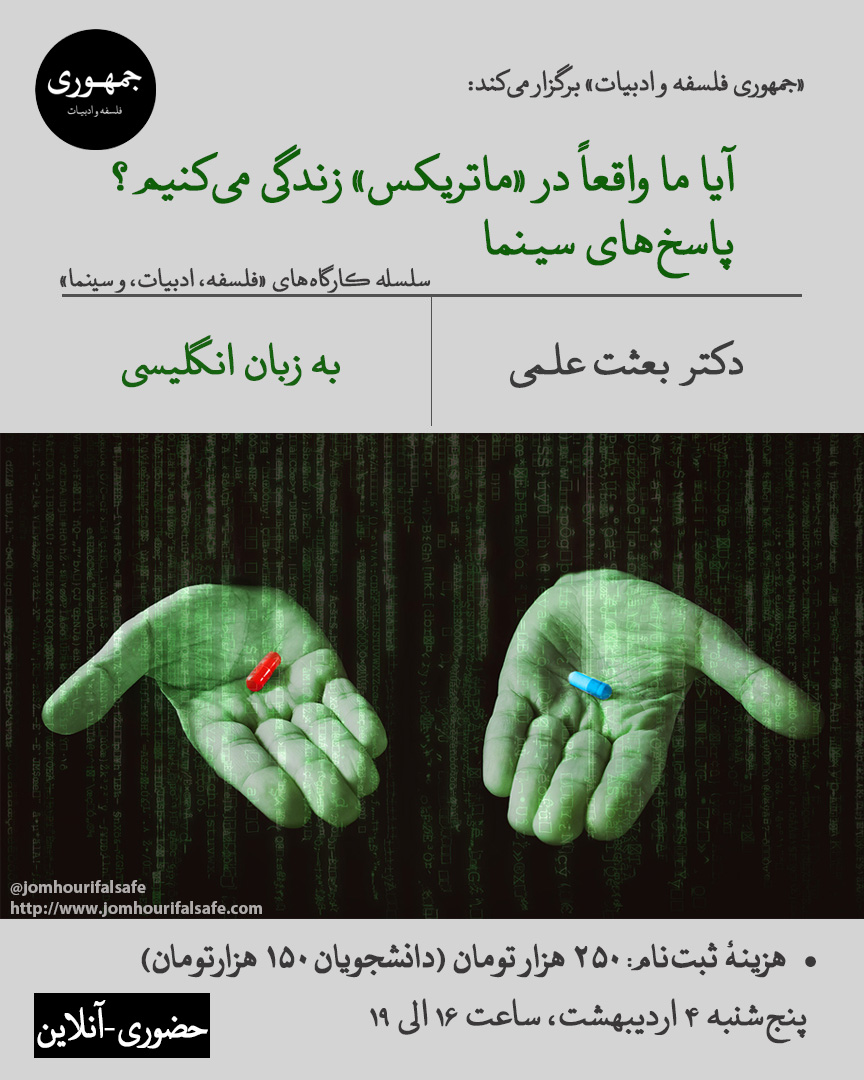آیا ما واقعاً در «ماتریکس» زندگی میکنیم؟ پاسخهای سینما
بعثت علمی
| (حضوری و آنلاین) | پنجشنبه ۴ اردیبهشت ۱۴۰۴، ساعت ۱۶ الی ۱۹
آیا ما واقعاً در «ماتریکس» زندگی میکنیم؟ پاسخهای سینما

از زمان اکران فیلم «ماتریکس» (The Matrix) در سال ۱۹۹۹، این تصور که ما انسانهای بیرون از دنیای «ماتریکس» هم شاید در جهانی شبیهسازیشده زندگی میکنیم پررنگتر شده است. برای نسلی که در بستر دستاوردهای سحرانگیز هوش مصنوعی رشد میکند، «از ماتریکس خارج شدن» ظاهراً دارد به دغدغهای جدی تبدیل میشود.
«ماتریکس» به بسیاری از مسائل ژرف («وجود جهان خارج»، «مسئلۀ ذهن و بدن»، «چیستی حقیقت»، «معنای زندگی»، و …) و پرسشهای درهمتنیدۀ تاریخ فلسفه دامن زده است؛ اما بیش از همه، آن انگارۀ کهنِ واقعیت همچون یک نمایش را، که نخست افلاطون در کتاب هفتم جمهوری با عنوان «تمثیل غار» بنیان نهاد، بار دیگر به مرکز بحثهای فلسفی و فرهنگی کشاند. نیک باستروم (Nick Bostrom)، فیلسوف سوئدی و مدیر «مؤسسۀ آیندۀ بشریت» در دانشگاه آکسفورد، بر این باور است ما به احتمال زیاد در یک شبیهسازی کامپیوتری زندگی میکنیم؛ دیوید چالمرز، فیلسوف ذهن سرشناس، باور دارد که اگرچه «فرضیۀ شبیهسازی» (The Simulation Hypothesis) الزاماً به شکاکیت دربارۀ وجود جهان خارج نمیانجامد، اما باید این فرضیه را جدی بگیریم.
در این میان، سینما نیز به کاویدن «فرضیۀ شبیهسازی» ادامه داده است. بسیار پیشتر از «ماتریکس»، در سال ۱۹۷۳، رِینر وِرنر فاسبیندر، از کارگردانان سرآمد موجِ نوی سینمای آلمان، فیلمی با عنوان «جهانْ روی سیم» (Welt am Draht) ساخت که در فرمی هوشمندانهتر به امکانِ وجود جهانهای شبیهسازیشده پرداخت. پس از «ماتریکس» نیز سینما با فیلمهای «تلقین» (۲۰۲۰) ساختۀ کریستوفرنولان، «آماده»، «بازیکن شمارۀ یک» (۲۰۱۸) ساختۀ استیون اسپیلبرگ، و … به این کاوش ذاتاً فلسفی میدان داده است.
در این نشست سهساعته (که به زبان انگلیسی برگزار میشود)، با رفتوبرگشتهایی بین برخی از مفاهیم فلسفی و برخی از فیلمهای سینمایی به این پرسش خواهیم پرداخت که «آیا ما واقعاً در ماتریکس زندگی میکنیم؟»، و به همین ترتیب، «آیا خروج از ماتریکس (با فرض درستی این فرضیه) ممکن خواهد بود؟».
پرسشهای محوری و فیلمهایی که در طول این نشست به آنها ارجاع خواهیم داد:
- «آیا ما واقعاً در ماتریکس زندگی میکنیم؟»
The Matrix (1999) Welt am Draht (World on a Wire) (1973)
- آیا اساساً میتوانیم بدانیم که «آیا ما واقعاً در ماتریکس زندگی میکنیم؟»
Existenz (1999)
- آیا اساساً فرقی میکند (مهم است؟) که بدانیم که «آیا ما واقعاً در ماتریکس زندگی میکنیم؟» یا نه؟
Total Recall (1990)
- آیا همه دوست خواهند داشت که از ماتریکس خارج شوند؟
Are We Really Living in the Matrix? Cinematic Responses
Since the release of The Matrix in 1999, the idea that we, humans outside the trilogy's simulated world, might also be living in a simulation has gained prominence. For a generation shaped by the groundbreaking advancements in artificial intelligence, “escaping the Matrix” appears to be an emerging significant concern. The Matrix single-handedly propelled profound questions—such as “the external world”, “the mind-body problem”, “the nature of truth”, etc.—and the intertwined inquiries in the history of philosophy beyond the confines of academia. Above all, The Matrix revived the ancient concept of reality as a spectacle, first formulated by Plato in Book VII of The Republic, famously known as “The Allegory of the Cave”, and brought it back to the forefront of philosophical and cultural discourse.
Nick Bostrom, the Swedish philosopher and director of the Future of Humanity Institute at Oxford University, argues that we are most likely living in a computer simulation. David Chalmers, a renowned philosopher of mind, maintains that while “The Simulation Hypothesis” does not necessarily lead to skepticism regarding the existence of the external world, it is a hypothesis that should be taken seriously.
In the meantime, cinema has also continued to explore “The Simulation Hypothesis”. Far earlier than The Matrix, in 1973, Rainer Werner Fassbinder, a leading director of the New German Cinema movement, directed Welt am Draht (World on a Wire), which delved into the possibility of simulated worlds in an even more sophisticated form. Following The Matrix, films such as Inception (2010) by Christopher Nolan, Ready Player One (2018) by Steven Spielberg, and others have further contributed to this inherently philosophical exploration.
In this three-hour session (in English), we will be shuttling between certain philosophical concepts and cinematic works to discuss the question: “Are we truly living in the Matrix?”—and in connection with this inquiry, “Would escaping the Matrix (assuming the hypothesis to be true) be possible?”
Key Questions and Films to Be Referenced in This Session:
-
Are we really living in the Matrix?
-
The Matrix (1999)
-
Welt am Draht (World on a Wire, 1973)
-
-
Is it possible for us to know whether we are living in the Matrix to begin with?
-
Existenz (1999)
-
-
Does it matter (would it make any difference at all) to know whether we are living in the Matrix or not?
-
Total Recall (1990)
-
-
Would everyone want to escape the Matrix?
اشتراکگذاری